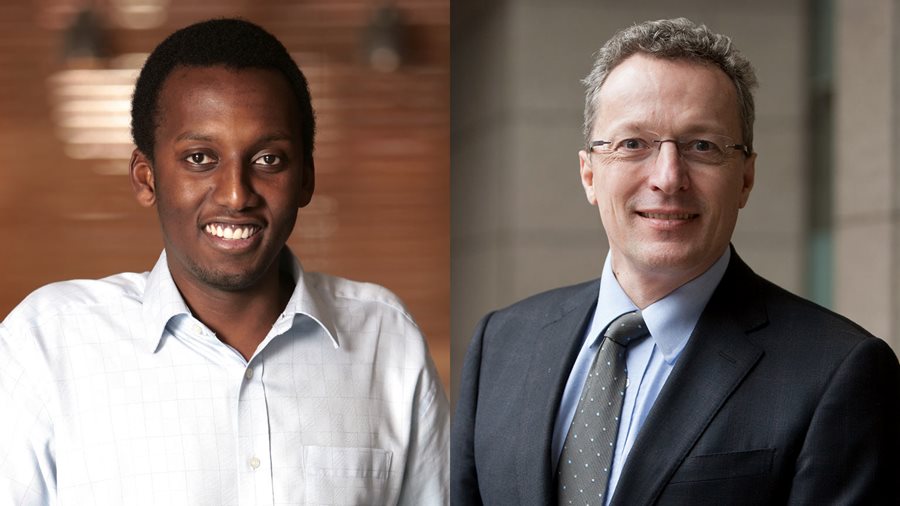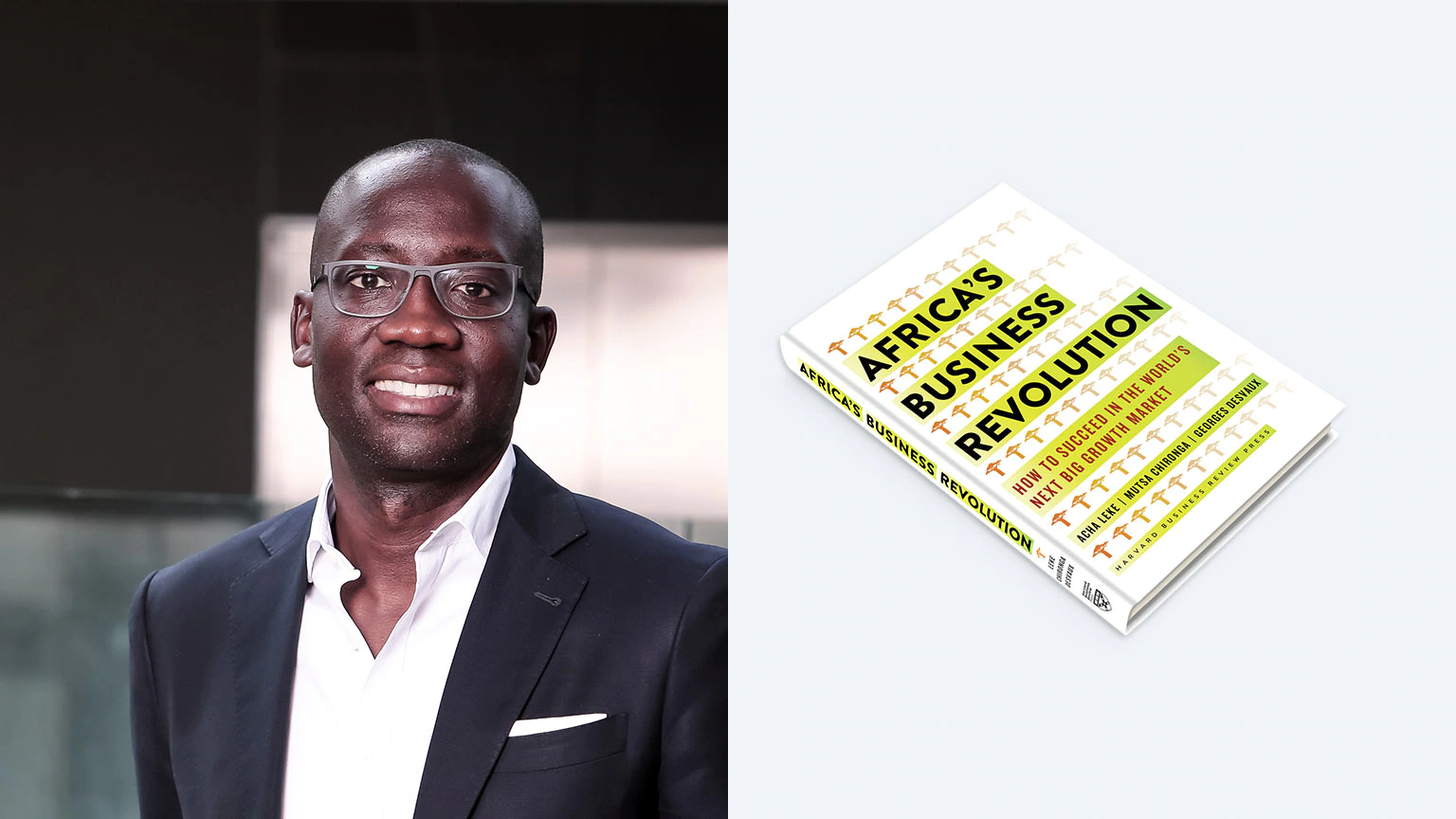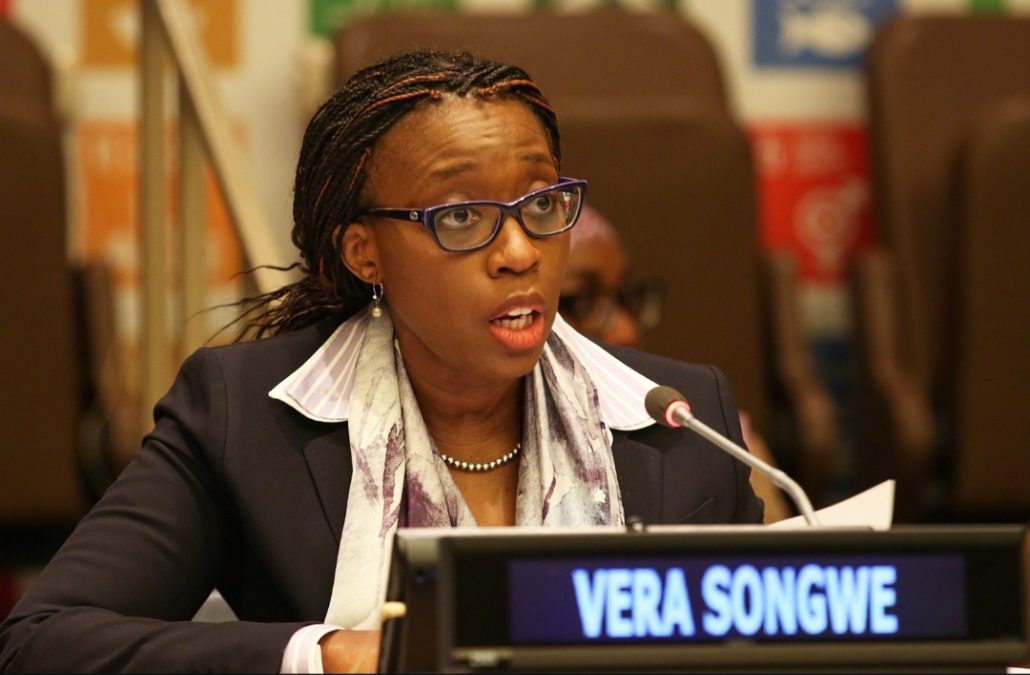Meet Acha Leke, senior partner, chair of McKinsey’s Africa office and co-author of Africa’s Business Revolution: How to Succeed in the World’s Next Big Growth Market
With more than 400 companies doing $1.0 billion in revenue, $1.4 trillion in consumer spending, and an average age of 19, Africa offers big business opportunities. So just how can you do it? We sat down with Acha Leke, senior partner and chairman of McKinsey’s Africa office, and coauthor of Africa’s Business Revolution: How to Succeed in the World’s Next Big Growth Market (Harvard Business School Press, November 2018), to find out what it takes to successfully do business in Africa.
Could you tell us about where you grew up?
I was born in Cameroon. My family left when I was about six months old for Montreal and returned to Cameroon’s capital city, Yaoundé, when I was about ten. I attended high school in Belgium, and college and graduate school in the US. It was during grad school at Stanford that I decided to do a summer internship with McKinsey in Johannesburg. At the end of my PhD, I rejoined the firm full-time in the Atlanta office, then transferred back to Johannesburg 2.5 years later.
What would you say about your upbringing that has shaped your outlook now?
When my parents finished their graduate studies in Canada—my dad is a gynecologist and my mom is an immunologist—they took the next plane home to put their new skills to good use for their country, Cameroon. I finished grad school in the 90s, and it was such a tumultuous time in Africa, that no one was going back. People were saying, “We’ll only return when things change.” But I felt that those of us who were fortunate enough to have received an education overseas had a responsibility, and even an obligation, to come home and create the change we so badly wanted.
When you started with McKinsey, there was only one office in Africa. What was it like as the firm expanded across the continent?
When I moved to the continent, the firm had 50 people based in Jo’burg. I was excited about the work we were doing in South Africa, but the rest of the continent also needed a lot of help, and there were lots of ways we could contribute as a firm. I was an engagement manager at the time, and I shared my aspiration to help expand our footprint across the continent with the six partners in the office. Three said, “Spend your time on other things, and you’ll be elected partner.” The other three said, “If that’s what you want to do, we’ll help you.” So I decided to follow my passion.
You’ve worked on some big projects. Which one is your favorite
One project in Uganda stands out. Uganda had the highest prevalence of HIV/AIDS in the world in the early 2000s. Antiretroviral (ARV) drugs had just come onto the market, but they cost $700 per person per month, while the average person in Uganda made $300 per year. Pharmaceutical companies were under a lot of pressure to reduce these prices, especially in emerging economies, but they were worried these drugs could end up smuggled into their core markets.
We went to Kampala to work on how to secure the distribution channels—and this evolved into how to strengthen the country’s health system. They didn’t at the time have enough capacity to manage a huge increase in people receiving these drugs, and we helped them figure out how to do that. We presented our work to a group of pharmaceutical CEOs along with WHO [World Health Organization] and UNAIDS [the Joint United Nations Programme on HIV/AIDS], and a few months later, they dropped the prices of these drugs by 90 per cent.
I’ll never forget that work. When we started, there were less than 10,000 people on ARVs. At the end of the year, after we were done, they were up to 70,000 people.
What inspired you to write this book?
We’ve been writing a lot of reports on Africa, and people have been encouraging us to write a book. A colleague suggested that we give it a go: “Let’s write a concept note and send it to publishers and see if they’re interested.” Turned out, they were. In this book, we build on our research and the 3,000-plus projects we have done in Africa. Most of our past reports focused on the what: Where is the opportunity? Which sectors? Which countries? But this book focuses on the how: How do you build a profitable and sustainable business on the continent?
How did you and your coauthors come together?
Nous nous efforçons de fournir aux personnes handicapées un accès égal à notre site Web. Si vous souhaitez des informations sur ce contenu, nous serons heureux de travailler avec vous. Veuillez nous envoyer un courriel à : McKinsey_Website_Accessibility@mckinsey.com

Mutsa [Chironga] wrote a lot of the MGI [McKinsey Global Institute] reports with me. Georges [Desvaux] ran the firm in Africa at the time. He had also spent 7 years in Japan and 7 years in China, so he had a unique pattern recognition across geographies.
Why do you think there was such a demand for this book?
The publishers told us that they’ve been looking for a real guidebook on business in Africa. A lot of our earlier reports focused on making the case for why people should take Africa seriously. Our 2010 report “Lions on the move: The progress and potential of African economies” did this, and it actually won an award at the World Bank/IMF [International Monetary Fund] spring meetings as the initiative that best promoted Africa as an investment destination that year.
Our next set of reports were once again focused on identifying and sizing the business opportunity across countries and sectors. It was time for the next step: If you’re in business, what do you need to do to succeed on the continent? Now that the world has for the most part bought into the Africa opportunity, the big question is how to capture it. That’s what the book is about.
Were you surprised by anything in your research?
We interviewed 40 senior business and development leaders, built on MGI’s proprietary research, and studied over 20 successful companies in Africa, from multinationals to start-ups, etc. The biggest theme that we found was that the companies that do well in Africa were the companies that address a fundamental societal need. Companies that come in not only because they want to make money but also because they really want to help solve a real problem—whether it’s access to affordable electricity or that financial services are made available to a broader segment of the population. This mind-set, this ethos, is critically important.
Is this a difficult mind-set shift for people?
I think you either have it or you don’t. It was apparent that the companies and the people we interviewed came to try and help solve a key problem on the continent. They see problems as opportunities. And from that they’re able to build durable and profitable businesses. Companies in Africa actually tend to grow faster and are more profitable than their peers around the world, because once you get the business model right, it’s actually more difficult for folks to come in and try to replicate it.
What do you think the biggest challenge will be for business in Africa over the next decade?
The thing with Africa is that no matter where you look, there are challenges from its lack of infrastructure and challenges in the business environment, due to the small size of many markets and concentration in some sectors. On the flip side, if you look at it through an opportunity lens, you see that it has the youngest population in the world—the median age is 19—it’s fast-growing, it’s urbanizing rapidly, and technology is transforming everything. In this context, the companies that win will need to take a long-term perspective. So the biggest challenge, in my mind, is for companies to understand this, be willing to ride through the short-term volatilities—and there will be many—while keeping their eye on the overall prize.
About ACHA LEKE
Acha is a senior partner in McKinsey’s Johannesburg office, Chairman of McKinsey’s Africa region, and a member of McKinsey’s Shareholders Council–our global governance board. He started his career at McKinsey as a summer associate in South Africa in 1998. He rejoined the firm in Atlanta in 1999 and transferred back to Johannesburg in 2002 to help expand the firm’s activities across Sub- Saharan Africa.
Acha relocated to Lagos in 2010 to open up the firm’s newly established office in Nigeria and returned to South Africa in 2014. He leads the firm’s Private Equity & Principal Investors Practice in Africa and is a member of the McKinsey Global Institute (MGI) Council. Until December 2018, he led the Public & Social Sector Practice in Africa and was also the senior partner in charge of global recruiting for McKinsey worldwide.
Acha serves governments, multinationals, and private sector institutions across Africa on issues of economic development, tax administration, growth strategies, holistic transformations, and investment decisions. He has worked across more than 20 African countries to date.
Prior to joining McKinsey, Acha worked as a part-time consultant on novel techniques to linearize high power amplifiers for wireless applications, while completing a PhD in Electrical Engineering at Stanford University. He also received an MS in Electrical Engineering and an MS in Industrial Engineering and Engineering Management from Stanford University, as well as a Bachelor of Electrical Engineering summa cum laude, with a minor in Economics, from the Georgia Institute of Technology, where he graduated as the first Black Valedictorian in the School’s history and was elected to Tau Beta Pi and Eta Kappa Nu.
Acha is a co-founder and member of the Global Advisory Council of the African Leadership Academy, a co-educational boarding school that aims to develop the next generation of African leaders. He is also a co-founder of the African Leadership Network, a network of the current generation of African leaders who aspire to bring prosperity to the Continent.
He is a World Economic Forum (WEF) Young Global Leader Alumni (2008), and has received numerous recognitions including Africa’s Young Investment Professional of the year (Africa Investor, 2008); Top 40 men under 40 in South Africa (Destiny Man, 2010); Top 10 Youngest Power Men in Africa (Forbes, 2011); 50 Most Influential Africans (Africa Report, 2012, 2019; Jeune Afrique, 2018); 100 Most Influential Africans (New African, 2012, 2014, 2015, 2016; Jeune Afrique, 2019); Top 20 next-generation Francophone Africans (Forbes, 2013); Top 40 under 40 in Nigeria (Business Day, 2013); and Top 20 Rising Stars in Africa (Euromoney, 2014).
Acha served on the WEF’s Global Future Council on economic growth and social inclusion for two years, after having served for eight years on the Global Agenda Council for Africa; he also served on ONE’s Africa Policy Advisory Board.
He is a member of the Lagos Business School advisory board, and of President Kagame’s African Union (AU) Reform Steering Committee. He co-authored McKinsey’s highly acclaimed series of reports Lions on the Move and the latest book Africa’s Business Revolution: How to Succeed in the World’s Next Big Growth Market. He is regularly featured in various media—including CNN, CNBC, Bloomberg, Economist, FT, Wall Street Journal, Jeune Afrique, Harvard Business Review, and others.
Acha is from Cameroon, and is fluent in both English and French.
Source: McKinsey.com


![Constance Ejuma, Cameroonian actress of Black Panther: “I am here in Buea in the spirit of sharing my experience” [Video]](http://camerexcellence.com/wp-content/uploads/2023/05/xconstance-ejuma-black-panther-lefilcamerounais-3-1080x675.jpeg.pagespeed.ic.LKiKYxkq3y.jpg)

0 Comments